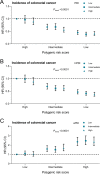Plant-based dietary patterns, genetic predisposition and risk of colorectal cancer: a prospective study from the UK Biobank
- PMID: 37759216
- PMCID: PMC10536761
- DOI: 10.1186/s12967-023-04522-8
Plant-based dietary patterns, genetic predisposition and risk of colorectal cancer: a prospective study from the UK Biobank
Abstract
Background: Plant-based dietary patterns may affect colorectal cancer (CRC) related outcomes, while risks differ in the quality of plant foods. We aimed to examine the association of plant-based diet quality with risks of CRC incidence and mortality and whether this association was modified by genetic risk.
Methods: This prospective cohort study included 186,675 participants free of cancer when the last dietary recall was completed. We calculated three plant-based diet indices (PDIs), i.e., the overall plant-based diet index (PDI), the healthful plant-based diet index (hPDI), and the unhealthful plant-based diet index (uPDI) representing adherence to plant-based diets with diverse quality. Genetic risk was characterized using a weighted polygenic risk score (PRS), capturing overall risk variants associated with CRC. Hazard ratios (HR) and 95% confidential intervals (CI) were estimated by the cause-specific Cox proportional hazards model.
Results: Over a follow-up of 9.5 years, 2163 cases and 466 deaths from CRC were documented. The HR of CRC incidence was 0.88 (95% CI, 0.81-0.96) and 0.91 (95% CI, 0.84-0.99) per 10-score increase in PDI and hPDI, respectively. Compared to the lowest quartile, PDI, hPDI, and uPDI in the highest quartile were associated with a 13% decrease, a 15% decrease, and a 14% increase in risk of incident CRC, respectively. We found a joint association of genetic risk and PDIs with incident CRC, with the highest hazard observed in those carrying higher PRS and adhering to lower-quality PDIs. The inverse association of PDI and hPDI with CRC mortality was pronounced in males.
Conclusions: Our results suggested that better adherence to overall and healthful plant-based diets was associated with a lower risk of CRC, whereas an unhealthful plant-based diet was associated with a higher CRC risk. Consumption of a higher-quality plant-based diet combined with decreased genetic risk conferred less susceptibility to CRC. Our findings highlighted the importance of food quality when adhering to a plant-based dietary pattern for CRC prevention in the general population.
Keywords: Colorectal cancer; Diet quality; Plant-based diet indices; Polygenic risk score; UK Biobank.
© 2023. The Author(s).
Conflict of interest statement
The authors declare that they have no competing interests.
Figures



Similar articles
-
Plant-based diets, genetic predisposition and risk of non-alcoholic fatty liver disease.BMC Med. 2023 Sep 12;21(1):351. doi: 10.1186/s12916-023-03028-w. BMC Med. 2023. PMID: 37697334 Free PMC article.
-
Association of plant-based diets with total and cause-specific mortality across socioeconomic deprivation level: a large prospective cohort.Eur J Nutr. 2024 Apr;63(3):835-846. doi: 10.1007/s00394-023-03317-3. Epub 2024 Jan 9. Eur J Nutr. 2024. PMID: 38194192
-
The quality of plant-based diets and liver cancer incidence and liver disease mortality in the UK Biobank.Clin Nutr ESPEN. 2025 Jun;67:541-548. doi: 10.1016/j.clnesp.2025.03.166. Epub 2025 Apr 3. Clin Nutr ESPEN. 2025. PMID: 40187730
-
Scoping review of the association of plant-based diet quality with health outcomes.Front Nutr. 2023 Aug 10;10:1211535. doi: 10.3389/fnut.2023.1211535. eCollection 2023. Front Nutr. 2023. PMID: 37637943 Free PMC article.
-
The association between overall, healthy, and unhealthy plant-based diet indexes and risk of all-cause and cause-specific mortality: a systematic review and dose-response meta-analysis of prospective cohort studies.Food Funct. 2025 Mar 17;16(6):2194-2212. doi: 10.1039/d4fo04741a. Food Funct. 2025. PMID: 40018753
Cited by
-
Trajectories of plant-based dietary patterns and their sex-specific associations with cardiometabolic health among young Australian adults.Int J Behav Nutr Phys Act. 2025 May 27;22(1):62. doi: 10.1186/s12966-025-01765-0. Int J Behav Nutr Phys Act. 2025. PMID: 40426187 Free PMC article.
-
Acceptability of a Colorectal Cancer-Preventive Diet Promoting Red Meat Reduction and Increased Fiber and Micronutrient Intake: A Cross-Sectional Study in Romanian Adults.Nutrients. 2025 Jul 21;17(14):2386. doi: 10.3390/nu17142386. Nutrients. 2025. PMID: 40733011 Free PMC article.
-
The burden of colorectal cancer attributable to high body mass index in China: findings from 1990 to 2021 and prediction to 2035.Int J Colorectal Dis. 2025 May 5;40(1):108. doi: 10.1007/s00384-025-04877-y. Int J Colorectal Dis. 2025. PMID: 40323366 Free PMC article.
-
Plant-based dietary patterns and breast cancer risk in the European prospective investigation into cancer and nutrition (EPIC) study.Eur J Epidemiol. 2025 Jul 14. doi: 10.1007/s10654-025-01277-y. Online ahead of print. Eur J Epidemiol. 2025. PMID: 40658296
References
-
- Magkos F, Tetens I, Bügel SG, Felby C, Schacht SR, Hill JO, Ravussin E, Astrup A. A perspective on the transition to plant-based diets: a Diet Change May attenuate Climate Change, but can it also attenuate obesity and chronic disease risk? Adv Nutr. 2020;11:1–9. doi: 10.1093/advances/nmz090. - DOI - PMC - PubMed
-
- Springmann M, Wiebe K, Mason-D’Croz D, Sulser TB, Rayner M, Scarborough P. Health and nutritional aspects of sustainable diet strategies and their association with environmental impacts: a global modelling analysis with country-level detail. Lancet Planet Health. 2018;2:e451–461. doi: 10.1016/S2542-5196(18)30206-7. - DOI - PMC - PubMed
Publication types
MeSH terms
Grants and funding
- 2021YFC2500400/National Key R&D Program of China
- 2021YFC2500401/National Key R&D Program of China
- 81974488/National Natural Science Foundation of China
- TJYXZDXK-009A/Tianjin Key Medical Discipline (Specialty) Construction Project
- YESS20210143/Young Elite Scientists Sponsorship Program by China Association for Science and Technology
LinkOut - more resources
Full Text Sources
Medical

